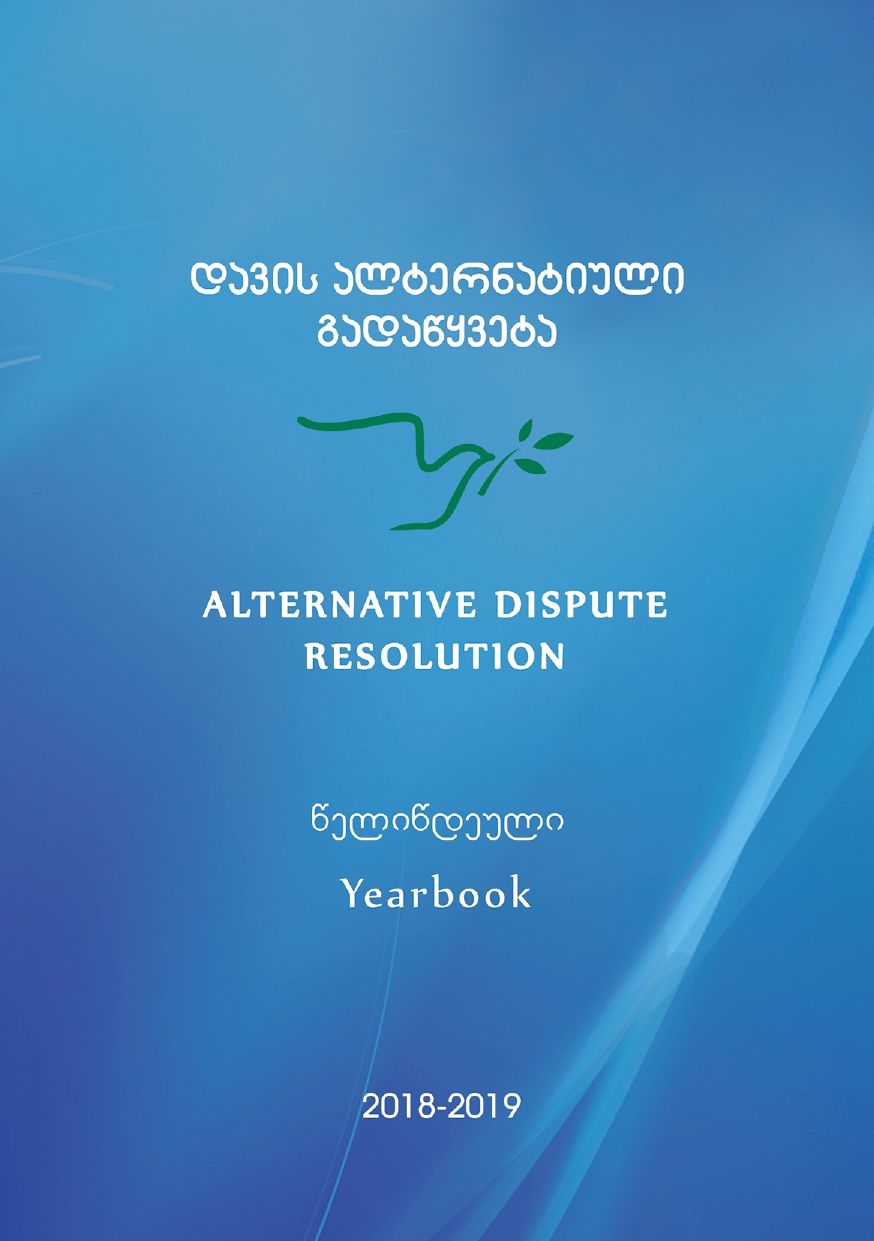Independent Process of Settlement - from Conflict to Consensus
Keywords:
Settlement, Conflict, Consensus, Communication, Settlement Efforts, Settlement Negotiations, Settlement Offers.Abstract
The article offers the analysis of one of the key issues of civil procedure - closure of a civil case through the independent process of settlement from conflict to consensus, its legal importance and characteristics.
The article focuses on the concept of settlement process and procedural meaning of settlement, which is not interpreted In Georgian legal space and respectively, the parallel is made with German law. Specifically, based on below judgments it is deduced that settlement is substantial phenomenon on the one hand and procedural on the other. According to the reasoning offered in the article determination of dual nature of settlement is itself connected with the definition of a right, where of crucial importance is the fact of its application, its exercise.
According to the reasoning offered in the article settlement is a legal phenomenon with dual nature.
Settlement, as a procedural phenomenon, implies settlement as an independent process and settlement as a constituent part of civil proceedings. It should be mentioned, that dual legal nature of settlement is indivisible. They are discussed together and simultaneously, what is conditioned by the accessory nature of closure of a civil case. The independent process of settlement implies a way from conflict to consensus, following what the settlement, as an independent process, acquires accessory nature and becomes grounds for the closure of case proceedings.
The fundamental legal characteristic of settlement process is its systemic nature.
According to reasoning offered in the article the independent process of settlement implies the systemic nature of relations, which is not unambiguous, has no legal regulation and mostly depends on the basic principles of contract negotiations, dispute resolution, settlement. Of essential and crucial importance is the consistent conduct of settlement procedure through settlement attempts, settlement conferences. Particular attention should be paid to communication phase of settlement process, which actually continues throughout the whole process.
According to reasoning of the article the settlement conditions should be clear, unambiguous, explicit, and should be oriented on the main purpose, i.e. on dispute resolution and closure of the case. A settlement offer should not be conditional, it should not depend on some future and unknown event, because such a condition will never become either a legal guarantee for conflict resolution or the ground for termination of case proceedings in the court of law. For better guarantee, a settlement condition can be secured with a collateral, envisaged by law - through mortgage or pledge in the case of monetary obligations. As regards surety, being a personal collateral is cannot be applied when a guarantor is not a party to proceedings.
The conclusion of the article summarises, that the independent process of settlement has no statutory regulation, there is no legal definition of settlement process and the phases thereof are not regulated at the legislative level. Hence, for the independent process of settlement to play the adequate role within the legal system as a ground for termination of case proceedings, it is reasonable for the Code of Civil Procedure to allocate a special chapter for the legal meaning of settlement, where the settlement procedure will be discussed from a conflict to consensus as a process with relevant set of legal principles and characteristics aiming at the termination of case proceedings.
References
Civil Code of Georgia, 26/06/1997.
Code of Civil Procedure of Georgian, 14/11/1997.
Austermiller S. M., Svenson D. R., Alternative Means of Dispute Settlement in Georgia, Tbilisi, 2014, 86.
Chachanidze E., Zodelava T., Gogishvili M., Sulkhanishvili M., Communication in the Court, Tbilisi, 2013, 8 (In Georgian).
Chaladze G., Mediation and Conflict Psychology, Mediation - Conflict Settlement through Negotiations, Tbilisi, 2014, 23 (In Georgian).
Chanturia L., Boeling H., Methodology of making court decisions on civil cases, Tbilisi, 2003, 30 (In Georgian).
Chechelashvili Z., Contract Law, Tbilisi, 2014, 33, 53, 54, 74, 97 (In Georgian).
Collection of Judgments and Decisions of the European Court of Human Rights 2012, GSC, Tbilisi, 2003, Introduction (In Georgian).
Corpholler J., German Civil Code, Educational Comments, 13th revised ed., Tbilisi, 2014, 77 (In Georgian).
Craver C. B., Alverson F. H., Effective Legal Negotiaton and Settlement, George Wa¬shington University Law School, Washington, D.C., 2010, 12.
Ervasti K., Conflicts Before the Courts and Court-annexed Mediation in Finland, Scandinavian Studies In Law, 1999-2012, 193(In Georgian).
Hollander -Blumoff R., Just Negotiation, Washington University Law Review, 2013, 408, 414, 420.
Jorbenadze R., Mediation, Tbilisi, 2012, 5, 12 (In Georgian).
Ian Ayres., Speidel R. E., Studies in Contract Law, USA, 2008, 1096.
Khubua G., Theory of Law, Tbilisi, 2015, 57, 60-61 (In Georgian).
Kobakhidze A., Civil Procedure Law, Tbilisi, 2003, 9 (In Georgian).
Korobkin R., Aspiration and Settlement, Cornel Law Review, 2002, 8.
Lempereur A.P., Collson O., Negotiation Method, Tbilisi, 2009, 1, 72, 86.
Liluashvili T., The Questions of Civil Procedure in Judicial Practice of Georgian Courts, Part I, Tbilisi, 2002, 115 (In Georgian).
Liluashvili T., Civil Procedural Law, 2nd ed., Tbilisi, 2005, 261 (In Georgian).
Liluashvili T., Liluashvili G., Khrustali V., Dzlierishvili Z., Civil Procedure Law, I Part, Tbilisi 2014 Civil Procedural Law, Part 1, Tbilisi, 2014, 59, 60, 66 (In Georgian)..
Llevin A. L., Shuchman P., Yamnb C. M., Civil Procedure, Cases and Materials – Successor Edition, New York, 1992, 520, 521, 549.
Lutheringhaus P., Methods for Decision on Civil Case, Judicial Seminar, Bakuriani, 18-21 October, 2007, 133.
Martin J. W., Drafting the Contract or Settlement Agreement That says aut of Court, The Breaf, 2003, 50.
Mediation, http://www.bambooweb.com/articles/M/e/Mediation.html, [01.02.2019].
Merrills J. G., International Dispute Settlement, New York, 2005, 12.
Nadler J., Rapport in Negotiation and Conflict Resolution, Marquette Law Review, 2003-2004, 877.
Nachkebia A., Interpretation of Civil Law Provisions in Supreme Court Practice (2000-2013), Tbilisi., 2014, 494. See also Case #a-792-1079-09, [09.11.2009].
Nachkebia A., Interpretation of Administrative Law Provisions in Supreme Court Practice (2005-2014), Tbilisi., 2015, 364. Case #1369-1308 (K10), 21.04.2010.
Peters A., International Dispute Settlement: A Network of Cooperational Disputies, Vol. 14, No.1, 1-34, Ejil 2003, 3.
Shengelia R., Chanturia L., Zoidze B., Ninidze T., Shengelia R., Khetsuriani J., Commentary on the Civil Code of Georgia, 2nd Vol., Book 4, Vol., Tbilisi, 2001, 228, 229.
Shotadze T., Mortgage, as a Mean to Secure Bank Credit, Tbilisi, 2012, 90 (In Georgian).
Shotadze T., Property Law, Tbilisi, 2014, 356, 377, 378 (In Georgian).
Sourdin T., Five Reasons Why Judges should Conduct Settlement Conferences, Australia Centre for Justice Inovacion (ACJI), Monash University Law Review, 2011, 148-152.
Starnes H. E., Finman S. E., The Court’s Role in Settlement Negotiations, Published in Family Advocate, Vol. 37, No. 3, 2015, 30.
Svanadze G., Dzlierishvili Z., Tsertsvadze G., Robakidze I., Svanadze G., Tsertsvadze L., Janashia L., Contract Law, Tbilisi, 2014, 102 (In Georgian)
Dye T.A., Carlton Fields P. A., Winning the Settlement – Keys to Negotiation Strategy, ABA Section of Litigation Corporate Counsel CLE Seminar, February 11-14, 2010, 9.
The thematic look at the decisions of the European Court of Human Rights, SCG, Tbilisi, 2013, 121 (In Georgian).
Totladze L., Gabrichidze G., Tumanishvili G., Turava P., Chachanidze E., Explanatory Law Dictionary, Tbilisi, 2012, 296 (In Georgian).
Tsertsvadze G., Mediation, Alternative Dispute Resolution (General Review), Tbilisi, 2010, 29, 74, 226, 236, 237, 271-272 (In Georgian).
Tsur M., Art of Drafting a Mediation Agreement, Guidelines, Alternative Dispute Resolution, ADR Yearbook, TSU Publishing House, Tbilisi, 2012, 225-227.
Tsvetkov V. L., Psychology of Conflict, Tbilisi, 2015, 12, 210 (In Georgian).
Yong K. S., Travis H. P., Oral Communication, Skills, Choices, and Consequences, Long Grove, Illion, 2012, 59 (In Georgian).
Handbook on the Peaceful Settlement of Disputes between States, Office of Legal Affairs Codification Division, United Nations, New York, 1992, 9.
Decision of the Civil Chamber of the Tbilisi Court of Appeals, November 05, 2013: # 2b / 1084-13.
Decision of the Chamber of Civil Cases of Tbilisi Court of Appeal 29 July 2015: #2b / 4936-14.
Decision of the Civil Chamber of the Tbilisi Court of Appeals on 06 October 2015: #2b / 3275-15.
Judgment of the Civil Chamber of the Supreme Court of Georgia of 22 September 2015 on the case: A-790-747-2015.









